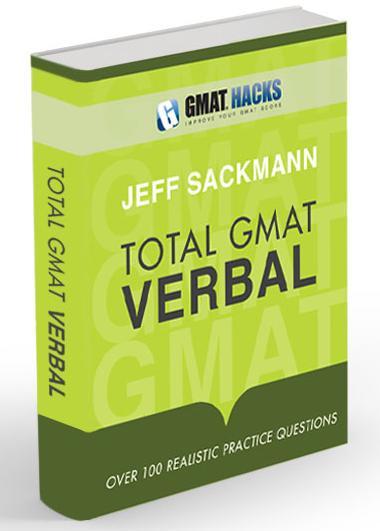
Bookshelf
|
|
Total GMAT Math Jeff's complete Quant guide, on sale now! |
|
|
Total GMAT Verbal Everything you need to ace GMAT Verbal! |
1,800 Practice Math Questions
Buy Jeff's books at Amazon.com

GMAT Official Guide, with IR
OG Math | OG Verbal
OG12 & Quant Rev solutions!
GMAT Question of the Day
Beginner's Guide to the GMAT
GMAT Hacks Affiliate Program

Recent Hacks

Categories
- General Study Tips
- Goals and Planning
- CAT Strategy
- The Mental Game
- GMAT Math Strategy
- GMAT Math Topics
- Mental Math
- Data Sufficiency
- Critical Reasoning
- Reading Comprehension
- Sentence Correction
- Analytical Writing Assessment
- Integrated Reasoning
- IR Explained
- Business School Admissions
- GMAT Prep Resources
- Practice Questions
- Total GMAT Math
- Total GMAT Verbal
- GMAT 111

Use "Stealth Studying" To Prepare For the GMAT More Efficiently
| You should follow me on Twitter. While you're at it, take a moment to subscribe to GMAT Hacks via RSS or Email. |
I hate cramming. I hate to hear that a student spent 10-12 hours on a weekend working on the GMAT. It's just not effective. Six hours evenly spread across six days is far more useful than 12 hours on a single day.
Naturally, then, I was excited to read this article about a technique the author calls "Stealth Studying." It's geared toward college students, but most of it applies to you, as well:
The stealth studying philosophy, however, states: the perceived difficulty of work grows with the amount of consecutive time you spend working. If you can take your test preparation and slice and dice it -- ninja style -- into a large number of small, 5-10 minute chunks, integrated naturally into your daily routine, spread over your whole semester, you will perceive next to no difficulty. In other words, it will feel to you as if you are doing no studying at all.
There are several important points here, most of which I've made elsewhere on this site:
- It's easier and less stressful to study in shorter blocks of time.
- Give yourself a number of weeks (8-12 is ideal), so that you can put in a large number of hours without cramming.
- Make the GMAT part of your life--not just a separate (often unappealing) world you slip into for a few hours every day.
GMAT Integration
This is easier said than done, but the key is to let your brain work on the GMAT as much as possible. I wrote recently on how to practice mental math even when you aren't doing GMAT practice problems, but that's just the tip of the iceberg.
I always recommend studying in the morning for this very reason. Not only do you give a prime, untired hour or two to the GMAT, but you'll have the test in the back of your head all day. The more hours you give your subconscious to work on the test, the more effective your conscious study time will be.
Also, take every opportunity to apply newly learned skills to real-life situations. The most obvious example (and, unfortunately, not GMAT-related, though it is relevant to the GRE) is vocabulary learning. If I tell you what "contumacious" means, you might remember it, but it probably won't stick until you use it in a sentence a couple of times.
You probably won't come across quadratic equations at work, but there are ample opportunities to practice mental math, along with GMAT topics such as geometry, weighted averages, and probability. And if you're imaginative, you can think about number theory every single time to encounter an integer. (For instance, what's interesting about 36? How about 37?)
One More Stealth Tip
Another tidbit that I emphatically endorse:
Fill in gaps in your understanding immediately! If left untreated, these topics collapse into test prep black holes.
If you don't understand something, doing 20 more problems isn't going to help you understand it. You don't need to completely stop what you're doing, but before the end of that study session, read the explanation and do your best to understand it.
Often, you will require more than just the explanation in the back of the book. My Total GMAT Math is a great quant resource for this sort of thing--if you run across a mixture question and have no idea how to attack it, you can read a few pages on mixtures and immediately see how the theory and underlying skills related to the question at hand.
Like the author of the "Stealth Studying" article, I can't tell you how to avoid studying altogether. But I do think these methods will help limit your stress, keep down the number of hours you spend on the GMAT, and improve your ultimate test score, all at the same time.
About the author: Jeff Sackmann has written many GMAT preparation books, including the popular Total GMAT Math, Total GMAT Verbal, and GMAT 111. He has also created explanations for problems in The Official Guide, as well as 1,800 practice GMAT math questions.
 |
Total GMAT Verbal
The comprehensive guide to the GMAT Verbal section. Recognize, dissect, and master every question type
you'll face on the test. Everything you need, all in one place, including 100+ realistic practice questions. |